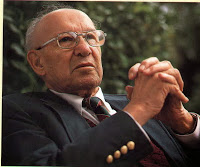A Day On Management With Rumelt and Drucker
 The most essential thing that shapes the future of companies is undoubtedly the managerial skills of the managers. As human resources professionals, we are in close contact with the management of the company. We are aligning our plans and programs to the company’s strategies and the decisions of the management.
The most essential thing that shapes the future of companies is undoubtedly the managerial skills of the managers. As human resources professionals, we are in close contact with the management of the company. We are aligning our plans and programs to the company’s strategies and the decisions of the management.
On Tuesday I attended two important summits in İstanbul. The first one was arranged by Yapı Kredi Banking Academy and the summit focused on the term “Strategy”. The second one was arranged by Peter Drucker Turkey Initiative and it was a panel with speakers from different fields.The keynote speaker of YapıKredi Banking Academy was Richard Rumelt. He is one the top influential names in the field of management and well known for his book Good Strategy, Bad Strategy. In his talk Rumelt mentioned that for a good strategy you need to define your challenge clearly and determine the steps you will take precisely. Additionally, a good strategy is not the one that stays at the idea level. You should definitely put it into practice.
Rumelt pointed the strategy Steve Jobs put into practice after his return to Apple; as an example to good strategy. In general, managers aim at enlarging their companies in terms of products, employees and activities in order to increase the sales price of the firm. Even though this is the most preferred way, Jobs did the opposite at that time. He decided to focus the activities of the firm on a smaller scale and took actions that targeted cutting the costs (e.g. Cut 15 desktop models to 1, cut 5 of 6 national retailers, move all manufacturing to Taiwan, establish web store to sell direct to customers). His strategy was a good with the challenge defined and steps determined.
When it comes to bad strategy… We can say that the vision sentences without actual action steps or the targets that only foresee performance improvement are examples of it. According to Rumelt bad strategy occurs when hard choices are avoided and when leaders are unwilling or unable to define and explain the nature of challenge.
 The second summit was a panel by Peter Drucker Turkey Initiative. Recently founded initiative aims at spreading Drucker’s ideas, thus affecting the management style in Turkey. Before getting to the panel I would like to share some information regarding Drucker. Peter Drucker (1999-2005) was an American management consultant, writer and academician. He is considered as the founder of modern management theory and was actively involved in the professional life until the age of 95. In his lifetime Drucker published 38 books and many articles and he taught students at the New York University for 21 years.
The second summit was a panel by Peter Drucker Turkey Initiative. Recently founded initiative aims at spreading Drucker’s ideas, thus affecting the management style in Turkey. Before getting to the panel I would like to share some information regarding Drucker. Peter Drucker (1999-2005) was an American management consultant, writer and academician. He is considered as the founder of modern management theory and was actively involved in the professional life until the age of 95. In his lifetime Drucker published 38 books and many articles and he taught students at the New York University for 21 years.
In the panel there were 12 speakers all with different managerial backgrounds. The panelists shared their experiences in parallel with Drucker’s discipline and there were 3 main points mentioned.
The first point was that managers should ask the question “Why” in addition to “What” and “How”. More precisely managers should ask themselves two vital questions: “Why whould my employees want to work in this company?” and “Why would my customers choose me?”. The answers to these questions are important since both the employees and the customers want to work with companies that carry meaning for them. The importance of these questions is explained by Simon Sinek in his TED Talk “How great leaders inspire action”. I suggest you to watch.
The second point generally mentioned was the expectations of Generation Y employees from their managers. The panelists mentioned that these employees expect to be involved in the management the decisions. In parallel with Drucker’s participatory management perception, all the employees including General Y employees should be the part of the management decisions.
The final point made during the panel was that the disciplines and doctrines originating from abroad should be adapted to local. In this respect Drucker’s doctrines should be adapted to Turkey considering its own culture, structure and past experiences.